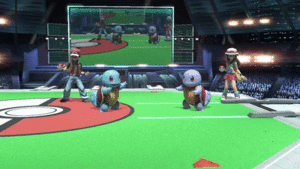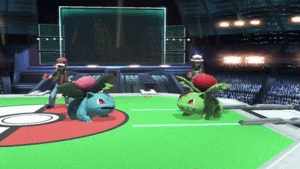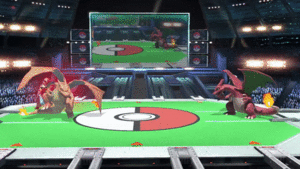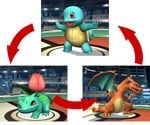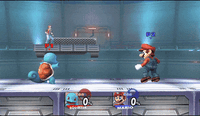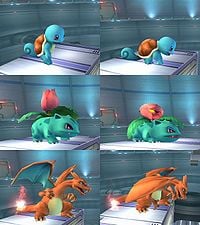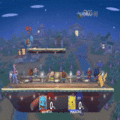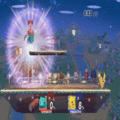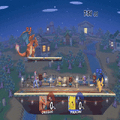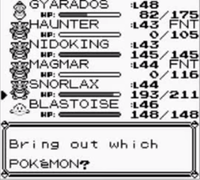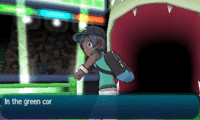Pokémon Change: Difference between revisions
m (→Gallery) |
(Smaller tab labels, just barely enough to avoid the line break.) |
||
| (118 intermediate revisions by 66 users not shown) | |||
| Line 1: | Line 1: | ||
{{ArticleIcons|brawl=y|ultimate=y}} | |||
:''This article is about Pokémon Trainer's down special. For Zelda and Sheik's down special in Melee and Brawl, see [[Transform]]. For Pyra and Mythra's down special, see [[Swap]].'' | |||
{{Infobox Special Move | {{Infobox Special Move | ||
|name=Pokémon Change | |name=Pokémon Change | ||
|image=[[ | |image={{tabber|title1=Squirtle to Ivysaur|content1=[[File:Squirtle Down B SSBU.gif|300px]]|title2=…to Charizard|content2=[[File:Ivysaur Down B SSBU.gif|300px]]|title3=…to Squirtle|content3=[[File:Charizard Down B SSBU.gif|300px]]}} | ||
|caption=Pokémon Change | |caption=Pokémon Change in ''Ultimate'' | ||
|user=[[Pokémon Trainer]] | |user=[[Pokémon Trainer]] | ||
|universe={{uv|Pokémon}} | |universe={{uv|Pokémon}} | ||
|interwiki=bulbapedia | |interwiki=bulbapedia | ||
|interwikiname=Bulbapedia | |interwikiname=Bulbapedia | ||
|interwikipage= | |interwikipage=Recall | ||
}} | }} | ||
<!-- | |||
REMINDER: Our Manual of Style states that all Pokémon are to use gender-neutral pronouns. | |||
--> | |||
'''Pokémon Change''' ({{ja|ポケモンチェンジ|Pokemon Chenji}}, ''Pokémon Change'') is | '''Pokémon Change''' ({{ja|ポケモンチェンジ|Pokemon Chenji}}, ''Pokémon Change'') is [[Pokémon Trainer]]'s [[down special move]]. | ||
==Overview== | |||
[[File:Pokemon change diagram.jpg|left|thumb|150px|The three available Pokémon in order (counterclockwise): Squirtle, Ivysaur, and Charizard.]] | |||
Pokémon Change is one of two moves that all three of the Trainer's Pokémon share, the other being their [[Final Smash]], [[Triple Finish]]. Performing it changes the Pokémon from [[Squirtle]] to [[Ivysaur]] to [[Charizard]] in that order. However, only one Pokémon needs to be knocked out to score against Pokémon Trainer, and the next Pokémon in line will be called out on the [[revival platform]]. | |||
{{clrl}} | |||
==Instructional quotes== | |||
{{InstructionalQuotes | |||
|ssbbcount=3 | |||
|ssbbchar=Squirtle | |||
|ssbbdesc=Call Squirtle back and swap it for a different Pokémon. Use a Pokémon for too long and it will tire. | |||
|ssbbchar2=Ivysaur | |||
|ssbbdesc2=Call Ivysaur back and swap it for a different Pokémon. Removing a tired Pokémon from battle lets it grow strong again. | |||
|ssbbchar3=Charizard | |||
|ssbbdesc3=Call Charizard back and swap it for a different Pokémon. Damage carries over to the next Pokémon. | |||
|ssbucount=3 | |||
|ssbuchar=Squirtle | |||
|ssbudesc=Switches to Ivysaur. Immune to damage initially, but become vulnerable if used repeatedly. | |||
|ssbuchar2=Ivysaur | |||
|ssbudesc2=Switches to Charizard. Immune to damage initially, but become vulnerable if used repeatedly. | |||
|ssbuchar3=Charizard | |||
|ssbudesc3=Switches to Squirtle. Immune to damage initially, but become vulnerable if used repeatedly. | |||
}} | |||
==In ''Brawl''== | |||
<!-- | |||
REMINDER: Our Manual of Style states that all Pokémon are to use gender-neutral pronouns. | |||
--> | |||
[[File:Pokemon Change.gif|left|thumb|Pokémon Trainer cycling through his Pokémon in ''Brawl''.]] | |||
If one Pokémon is [[KO]]'d, Pokémon Trainer will summon the next Pokémon in the rotation to the [[revival platform]]. Pokémon Change cannot be used again until the starting invincibility has worn off. Pokémon Change also cannot be used in midair. | If one Pokémon is [[KO]]'d, Pokémon Trainer will summon the next Pokémon in the rotation to the [[revival platform]]. Pokémon Change cannot be used again until the starting invincibility has worn off. Pokémon Change also cannot be used in midair. | ||
| Line 24: | Line 53: | ||
Like {{SSBB|Zelda}}'s [[Transform]], the next Pokémon to appear must be loaded from the disc before the switch can be completed. Pausing can shorten the in-game switch time (since the game loads during the pause), as can lag when online. If the switch time is artificially shortened as such, replays will temporarily freeze at the point the switch is made (since it must take the full time to load). Forcing the game to load the next character through an SD card via hacking will result in a near-instant switch time. | Like {{SSBB|Zelda}}'s [[Transform]], the next Pokémon to appear must be loaded from the disc before the switch can be completed. Pausing can shorten the in-game switch time (since the game loads during the pause), as can lag when online. If the switch time is artificially shortened as such, replays will temporarily freeze at the point the switch is made (since it must take the full time to load). Forcing the game to load the next character through an SD card via hacking will result in a near-instant switch time. | ||
A technique known as "zero switching" can be performed on horizontally moving platforms, which allows a Pokémon to switch out while leaving the player free to react immediately after the next Pokémon is switched in. To perform the technique, the player must initiate Pokémon Change while standing on the edge of a [[platform]] that is moving out from under them (such as the | In Event 5: Become the Champion!, this move will be disabled if the Pokémon Trainer loses two of his Pokémon, as the game eliminates any Pokémon that is KO'd. | ||
===Stamina=== | |||
<!-- | |||
REMINDER: Our Manual of Style states that all Pokémon are to use gender-neutral pronouns. | |||
--> | |||
[[File:PokemonFatigue.jpg|thumb|All three Pokémon's idle animations in prime condition and fatigued condition.]]'''Stamina''' is a measure of how much energy the Pokémon Trainer's Pokémon have in ''Brawl''. | |||
At the start of a match, each Pokémon has 100 points of stamina. When a Pokémon is in battle, its stamina drops by half a point every second, resulting in 3 minutes and 20 seconds of stamina. Pokémon also lose half a point for every attack they attempt. Once a Pokémon's stamina drops below 40, its standing animation changes to look fatigued, and its attack damage is multiplied by 0.7 + (0.3 × Stamina ÷ 100), with a corresponding reduction in knockback. Thus the attack damage multiplier ranges from 0.779 to 0.7 as stamina decreases. Pokémon regain 0.8 points of stamina per second when not being used, requiring 2 minutes and 5 seconds to fully replenish. When a Pokémon is KO'ed, its stamina is set to 100 − (0.3 × (100 − previous stamina)), so it will be 70% closer to full. This has no effect on the other Pokémon. | |||
The stamina mechanic hurts Pokémon Trainer's competitive usage. As a clear attempt to force players to use all of the Pokémon instead of sticking to one for an entire match, Pokémon Trainer mains are forced to learn three different characters and are penalized for using a single one for too long. This can also cause problems in [[matchup]]s, where one Pokémon may [[hard counter]] a certain opponent, but the player cannot take advantage of this without suffering a significant strength reduction, giving the opponent openings to strike back. This contrasts with other transforming characters, such as [[Zelda]] and [[Sheik]], who have no such penalties. | |||
In [[The Subspace Emissary]], stamina is removed, allowing exclusive usage of one Pokémon. | |||
===Zero switching=== | |||
A technique known as "zero switching" can be performed on horizontally moving platforms, which allows a Pokémon to switch out while leaving the player free to react immediately after the next Pokémon is switched in. To perform the technique, the player must initiate Pokémon Change while standing on the edge of a [[platform]] that is moving out from under them (such as the left edge of the [[Smashville]] platform when it is moving right). If done properly, the next Pokémon will appear in the air, leaving the player free to immediately input any aerial action. The zero switch also gives Squirtle and Ivysaur two midair jumps instead of one upon reappearance. Zero switching is commonly used competitively to avoid the high ending lag that results from switching normally (since the move cannot be started in midair, but this technique allows it to at least be ended in midair). | |||
<gallery> | |||
ZeroSwitchSquirtle.gif|Squirtle zero switching to Ivysaur. | |||
Ivysaurzeroswitch.gif|Ivysaur zero switching to Charizard. | |||
Charizardzeroswitch.gif|Charizard zero switching to Squirtle. | |||
</gallery> | |||
==In ''Ultimate''== | |||
<!-- | |||
REMINDER: Our Manual of Style states that all Pokémon are to use gender-neutral pronouns. | |||
--> | |||
In ''Super Smash Bros. Ultimate'', stamina is absent, allowing the use of one Pokémon without penalty. Pokémon Change can now be performed in mid-air and has a much faster switch time from not being subject to load times. This reduces the risk of switching Pokémon, greatly improving their synergy with one another. It also improves recovery options, as Charizard maintains its extra midair jump, and Ivysaur's [[Vine Whip]] no longer causes [[helpless]]ness should it miss the [[edge]]. In exchange, Pokémon Change now has a cooldown of approximately two seconds and no longer resets [[stale move negation]]. | |||
Pokémon Change grants intangibility frames on frame 1-25. This never changes despite the Skill List noting that spamming the move increases vulnerability. | |||
Aesthetically, in a match with [[8-Player Smash|at least 5 players]], in [[Squad Strike]]'s Tag Team mode, or on [[Custom Stages]], the Pokémon Trainer(s) will not appear on-screen - instead Poké Balls will be thrown and recalled from behind the screen. | |||
===Quick switch cancel=== | |||
Quick switch cancel is a technique to skip Pokémon Change's two-second cooldown. By using a special move, Pokémon Trainer will do a pointing animation, which overrides his recall animation. This allows him to use Pokémon Change immediately afterwards without the cooldown. The quickest special move to use for each Pokémon is Squirtle's [[Water Gun]] charged then jump-cancelled, Ivysaur's [[Vine Whip]], and Charizard's [[Flamethrower]] unheld. Ivysaur's [[Razor Leaf]] is practical for keeping a projectile in front of it, while being almost exactly as quick as Vine Whip. Vine Whip is helpful in mid-air to quick switch cancel from Squirtle to Charizard, as it does not cause helplessness. The rest of the special moves are less practical to quick switch cancel with, as they are either slow, too committal, or cause helplessness. Because the technique relies on overriding Pokémon Trainer's recall animation, the technique cannot be used if he is physically not on-screen (which occurs in matches with at least 5 players, in Squad Strike's Tag Team mode, and on Custom Stages). | |||
{{#widget:YouTube|id=jxyP00uysVY}} | |||
==Origin== | ==Origin== | ||
While the phrase "Pokémon Change" itself is | [[File:PokemonSwapScreen.png|thumb|left|The mid-battle Pokémon swap screen in ''Pokémon Red'' and ''Pokémon Blue''.]] | ||
[[File:GoPikachu.gif|thumb|The animation for sending out a Pokémon in ''Pokémon Sun'' and ''Pokémon Moon''.]] | |||
While the phrase "Pokémon Change" itself is only an official term in the Japanese version, it describes the act of switching out a Pokémon mid-battle. It is a crucial tactic in the games, both in-game and competitively, and takes place before all other actions for that turn, unless the change was initiated by a move such as {{iw|bulbapedia|Baton Pass|move}}. {{iw|bulbapedia|Pursuit|move}} is an exception to this, as it is designed to counter switching. In the games, as switching takes up the user's turn, the benefits of switching in a Pokémon to face a target it is effective against must be weighed against the risks of being hit hard, setup on, or simply out-predicted by the opponent. | |||
In the ''Pokémon'' games, switching out a Pokémon cures minor status effects and all temporary stat modifications, but major status effects and | In the ''Pokémon'' games, switching out a Pokémon cures minor status effects and all temporary stat modifications, but major status effects (such as paralysis and sleep) will remain unchanged, and HP is tracked individually for each Pokémon. This can be compared and contrasted to ''Brawl'', where the whole Pokémon team share the same damage, but a switched-out Pokémon regains stamina and has almost all status effects removed. | ||
The concept of stamina as ''Brawl'' uses it does not exist in the Pokémon games. There is no mechanic that naturally makes a Pokémon | The concept of stamina as ''Brawl'' uses it does not exist in the Pokémon games. There is no mechanic that naturally makes a Pokémon weaker the longer it remains in play, unless one counts the fact that moves have [[bulbapedia:Power Point|limited uses]] and a single Pokémon used too long will eventually be unable to do anything. Even then however, these limited uses do not replenish while the Pokémon is switched out. It however resembles battles in the anime and manga where trainers switch out Pokémon to let the recalled Pokémon rest. | ||
{{clr}} | |||
==Gallery== | ==Gallery== | ||
<gallery> | <gallery> | ||
Pokemon | Brawl Pokemon Change.jpg|{{SSBB|Pokémon Trainer}} swapping his Pokémon on [[Pokémon Stadium 2]]. | ||
Squirtle SSBU Skill Preview Down Special.png|Squirtle being switched out for Ivysaur as shown by the Move List in ''Ultimate''. | |||
Ivysaur SSBU Skill Preview Down Special.png|Ivysaur being switched out for Charizard as shown by the Move List in ''Ultimate''. | |||
Charizard SSBU Skill Preview Down Special.png|Charizard being switched out for Squirtle as shown by the Move List in ''Ultimate''. | |||
</gallery> | </gallery> | ||
==Names in other languages== | |||
{{langtable | |||
|ja={{ja|ポケモンチェンジ|Pokemon Chenji}}, ''Pokémon Change'' | |||
|en=Pokémon Change | |||
|fr=Changement de Pokémon | |||
|es=Cambio de Pokémon | |||
|de=Pokémon-Wechsel | |||
|it=Sostituzione Pokémon | |||
|nl=Pokémon-wissel | |||
|ru={{rollover|Смена Покемона|Smena Pokemona|?}} | |||
|ko={{rollover|포켓몬 체인지|Pokenmon Cheinji|?}}, ''Pokémon Change'' | |||
|zh_cn={{rollover|宝可梦替挽|Bǎokěmèng Tì Wǎn|?}} | |||
|zh_tw={{rollover|寶可夢替換|Bǎokěmèng Tìhuàn|?}} | |||
}} | |||
==Trivia== | ==Trivia== | ||
*With precise timing, the invincibility frames during Pokémon Change can be used to avoid all three of [[Tabuu]]'s Off Waves. | *With precise timing, the invincibility frames during Pokémon Change can be used to avoid all three of [[Tabuu]]'s Off Waves. | ||
* | *In ''Brawl'', only one character can be loaded at once, so if multiple Pokémon Changes or [[Transform]]s occur simultaneously, they must each wait for the previous one to complete. | ||
*If two Pokémon Trainers are using the same [[palette swap]] ( | *If two Pokémon Trainers are using the same [[palette swap]] (via [[team battle]] or a glitch), transforming into the other player's active character will be instant since the data is already active. | ||
*In '' | *In ''Brawl'', if Pokémon Change is used in mid-air, the Pokémon Trainer will just stare down at his Poké Ball and toss it up in the air twice. | ||
* | **This can also happen in [[The Subspace Emissary]] while the Trainer only has Squirtle, or on the last stock in the [[Event 5: Become the Champion!|Become the Champion!]] event as KO'd Pokémon are unavailable. | ||
* | **Another instance of this happening in [[The Subspace Emissary]] is while the Trainer is left outside the elevator, where he will not respawn until some floors below; but even once he does respawn, switching is unavailable. | ||
*In ''Brawl'', the Poké Balls used in the move are smaller and darker in color than the [[Poké Ball]] item, likely to prevent confusion between the two. | |||
*Pokémon Change is the only transformation move to return in ''Ultimate''. | |||
{{Multiple Special Moves|Pokémon Trainer|Squirtle | {{Multiple Special Moves|Pokémon Trainer|Squirtle|Ivysaur|Charizard}} | ||
[[Category:Pokémon universe]] | [[Category:Pokémon universe]] | ||
[[Category:Down special moves]] | [[Category:Down special moves]] | ||
[[Category:Pokémon Trainer]] | [[Category:Pokémon Trainer]] | ||
[[Category:Pokémon Trainer (SSBB)]] | |||
[[Category:Pokémon Trainer (SSBU)]] | |||
[[Category:Squirtle]] | [[Category:Squirtle]] | ||
[[Category:Squirtle (SSBB)]] | |||
[[Category:Squirtle (SSBU)]] | |||
[[Category:Ivysaur]] | [[Category:Ivysaur]] | ||
[[Category:Ivysaur (SSBB)]] | |||
[[Category:Ivysaur (SSBU)]] | |||
[[Category:Charizard]] | [[Category:Charizard]] | ||
[[Category:Charizard (SSBB)]] | |||
[[Category:Charizard (SSBU)]] | |||
Latest revision as of 17:39, March 14, 2024
- This article is about Pokémon Trainer's down special. For Zelda and Sheik's down special in Melee and Brawl, see Transform. For Pyra and Mythra's down special, see Swap.
| Pokémon Change | |
|---|---|
Pokémon Change in Ultimate | |
| User | Pokémon Trainer |
| Universe | Pokémon |
| Article on Bulbapedia | Recall |
Pokémon Change (ポケモンチェンジ, Pokémon Change) is Pokémon Trainer's down special move.
Overview[edit]
Pokémon Change is one of two moves that all three of the Trainer's Pokémon share, the other being their Final Smash, Triple Finish. Performing it changes the Pokémon from Squirtle to Ivysaur to Charizard in that order. However, only one Pokémon needs to be knocked out to score against Pokémon Trainer, and the next Pokémon in line will be called out on the revival platform.
Instructional quotes[edit]
| Call Squirtle back and swap it for a different Pokémon. Use a Pokémon for too long and it will tire. | ||
| Call Ivysaur back and swap it for a different Pokémon. Removing a tired Pokémon from battle lets it grow strong again. | ||
| Call Charizard back and swap it for a different Pokémon. Damage carries over to the next Pokémon. | ||
| Switches to Ivysaur. Immune to damage initially, but become vulnerable if used repeatedly. | ||
| Switches to Charizard. Immune to damage initially, but become vulnerable if used repeatedly. | ||
| Switches to Squirtle. Immune to damage initially, but become vulnerable if used repeatedly. |
In Brawl[edit]
If one Pokémon is KO'd, Pokémon Trainer will summon the next Pokémon in the rotation to the revival platform. Pokémon Change cannot be used again until the starting invincibility has worn off. Pokémon Change also cannot be used in midair.
While changing, there is a little time in which the Pokémon have invincibility frames. Thus the switching animation, which takes some time, can be used to "dodge" various attacks, most notably certain Final Smashes.
Notably, using Pokémon Change ends nearly all status effects on the Pokémon, both positive and negative. This includes super or mini size, Starman invincibility, metal form, Franklin Badges, Screw Attacks, etc. The exceptions to this rule are slowed-time, healing in progress, and Smash Ball readiness, all of which remain through the change. Any held item is immediately dropped.
Like Zelda's Transform, the next Pokémon to appear must be loaded from the disc before the switch can be completed. Pausing can shorten the in-game switch time (since the game loads during the pause), as can lag when online. If the switch time is artificially shortened as such, replays will temporarily freeze at the point the switch is made (since it must take the full time to load). Forcing the game to load the next character through an SD card via hacking will result in a near-instant switch time.
In Event 5: Become the Champion!, this move will be disabled if the Pokémon Trainer loses two of his Pokémon, as the game eliminates any Pokémon that is KO'd.
Stamina[edit]
Stamina is a measure of how much energy the Pokémon Trainer's Pokémon have in Brawl.
At the start of a match, each Pokémon has 100 points of stamina. When a Pokémon is in battle, its stamina drops by half a point every second, resulting in 3 minutes and 20 seconds of stamina. Pokémon also lose half a point for every attack they attempt. Once a Pokémon's stamina drops below 40, its standing animation changes to look fatigued, and its attack damage is multiplied by 0.7 + (0.3 × Stamina ÷ 100), with a corresponding reduction in knockback. Thus the attack damage multiplier ranges from 0.779 to 0.7 as stamina decreases. Pokémon regain 0.8 points of stamina per second when not being used, requiring 2 minutes and 5 seconds to fully replenish. When a Pokémon is KO'ed, its stamina is set to 100 − (0.3 × (100 − previous stamina)), so it will be 70% closer to full. This has no effect on the other Pokémon.
The stamina mechanic hurts Pokémon Trainer's competitive usage. As a clear attempt to force players to use all of the Pokémon instead of sticking to one for an entire match, Pokémon Trainer mains are forced to learn three different characters and are penalized for using a single one for too long. This can also cause problems in matchups, where one Pokémon may hard counter a certain opponent, but the player cannot take advantage of this without suffering a significant strength reduction, giving the opponent openings to strike back. This contrasts with other transforming characters, such as Zelda and Sheik, who have no such penalties.
In The Subspace Emissary, stamina is removed, allowing exclusive usage of one Pokémon.
Zero switching[edit]
A technique known as "zero switching" can be performed on horizontally moving platforms, which allows a Pokémon to switch out while leaving the player free to react immediately after the next Pokémon is switched in. To perform the technique, the player must initiate Pokémon Change while standing on the edge of a platform that is moving out from under them (such as the left edge of the Smashville platform when it is moving right). If done properly, the next Pokémon will appear in the air, leaving the player free to immediately input any aerial action. The zero switch also gives Squirtle and Ivysaur two midair jumps instead of one upon reappearance. Zero switching is commonly used competitively to avoid the high ending lag that results from switching normally (since the move cannot be started in midair, but this technique allows it to at least be ended in midair).
In Ultimate[edit]
In Super Smash Bros. Ultimate, stamina is absent, allowing the use of one Pokémon without penalty. Pokémon Change can now be performed in mid-air and has a much faster switch time from not being subject to load times. This reduces the risk of switching Pokémon, greatly improving their synergy with one another. It also improves recovery options, as Charizard maintains its extra midair jump, and Ivysaur's Vine Whip no longer causes helplessness should it miss the edge. In exchange, Pokémon Change now has a cooldown of approximately two seconds and no longer resets stale move negation.
Pokémon Change grants intangibility frames on frame 1-25. This never changes despite the Skill List noting that spamming the move increases vulnerability.
Aesthetically, in a match with at least 5 players, in Squad Strike's Tag Team mode, or on Custom Stages, the Pokémon Trainer(s) will not appear on-screen - instead Poké Balls will be thrown and recalled from behind the screen.
Quick switch cancel[edit]
Quick switch cancel is a technique to skip Pokémon Change's two-second cooldown. By using a special move, Pokémon Trainer will do a pointing animation, which overrides his recall animation. This allows him to use Pokémon Change immediately afterwards without the cooldown. The quickest special move to use for each Pokémon is Squirtle's Water Gun charged then jump-cancelled, Ivysaur's Vine Whip, and Charizard's Flamethrower unheld. Ivysaur's Razor Leaf is practical for keeping a projectile in front of it, while being almost exactly as quick as Vine Whip. Vine Whip is helpful in mid-air to quick switch cancel from Squirtle to Charizard, as it does not cause helplessness. The rest of the special moves are less practical to quick switch cancel with, as they are either slow, too committal, or cause helplessness. Because the technique relies on overriding Pokémon Trainer's recall animation, the technique cannot be used if he is physically not on-screen (which occurs in matches with at least 5 players, in Squad Strike's Tag Team mode, and on Custom Stages).
Origin[edit]
While the phrase "Pokémon Change" itself is only an official term in the Japanese version, it describes the act of switching out a Pokémon mid-battle. It is a crucial tactic in the games, both in-game and competitively, and takes place before all other actions for that turn, unless the change was initiated by a move such as Baton Pass. Pursuit is an exception to this, as it is designed to counter switching. In the games, as switching takes up the user's turn, the benefits of switching in a Pokémon to face a target it is effective against must be weighed against the risks of being hit hard, setup on, or simply out-predicted by the opponent.
In the Pokémon games, switching out a Pokémon cures minor status effects and all temporary stat modifications, but major status effects (such as paralysis and sleep) will remain unchanged, and HP is tracked individually for each Pokémon. This can be compared and contrasted to Brawl, where the whole Pokémon team share the same damage, but a switched-out Pokémon regains stamina and has almost all status effects removed.
The concept of stamina as Brawl uses it does not exist in the Pokémon games. There is no mechanic that naturally makes a Pokémon weaker the longer it remains in play, unless one counts the fact that moves have limited uses and a single Pokémon used too long will eventually be unable to do anything. Even then however, these limited uses do not replenish while the Pokémon is switched out. It however resembles battles in the anime and manga where trainers switch out Pokémon to let the recalled Pokémon rest.
Gallery[edit]
Pokémon Trainer swapping his Pokémon on Pokémon Stadium 2.
Names in other languages[edit]
Trivia[edit]
- With precise timing, the invincibility frames during Pokémon Change can be used to avoid all three of Tabuu's Off Waves.
- In Brawl, only one character can be loaded at once, so if multiple Pokémon Changes or Transforms occur simultaneously, they must each wait for the previous one to complete.
- If two Pokémon Trainers are using the same palette swap (via team battle or a glitch), transforming into the other player's active character will be instant since the data is already active.
- In Brawl, if Pokémon Change is used in mid-air, the Pokémon Trainer will just stare down at his Poké Ball and toss it up in the air twice.
- This can also happen in The Subspace Emissary while the Trainer only has Squirtle, or on the last stock in the Become the Champion! event as KO'd Pokémon are unavailable.
- Another instance of this happening in The Subspace Emissary is while the Trainer is left outside the elevator, where he will not respawn until some floors below; but even once he does respawn, switching is unavailable.
- In Brawl, the Poké Balls used in the move are smaller and darker in color than the Poké Ball item, likely to prevent confusion between the two.
- Pokémon Change is the only transformation move to return in Ultimate.
